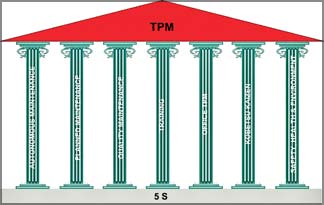Total Productive Maintenance
A new paradigm in manufacturing:
Thilak Pushpakumara (JIPM accredited TPM
instructor) CEO/Lean Management Consultant; Institute of Lean Management
(Pvt) Ltd Former Plant Manager, Unilever, Sri Lanka, Former General
Manager, Productivity Improvement and Training and Development, Loadstar
Pvt, Limited
Total Productive Maintenance (TPM) is a unique Japanese system which
has been developed from the Preventive or Productive Maintenance (PM)
concepts introduced from the USA. Preventive Maintenance was introduced
in 1951 and then it developed into Corrective Maintenance in 1957.
Maintenance Prevention was introduced as an activity to re-design the
equipment and line, in order to be maintenance free.
|

TPM aims at establishing a corporate culture that will
maximize production system effectiveness |
The Japan Institute of Plant Maintenance (JIPM) began promoting TPM
in fabrication and assembly industries and later it was actively adopted
in process industries. In 1971, Nippon Denso Co. Ltd. First introduced
and successfully implemented TPM in Japan. This was the beginning of TPM
in Japan. Since then, TPM has spread throughout Japan, especially in the
Toyota group. However, TPM has made a gradual change and the tendency to
implement Condition Based Maintenance (CBM) can be seen from the early
80s. Implementing TPM in administrative and support department is
increasing rapidly in Japan.
Interest in TPM outside Japan has also expanded in recent years. Many
companies in the United States, Europe, Asia and South America are
planning to or are actively pursuing TPM. Many companies in India have
implemented TPM and achieved both tangible and intangible results.
Unilever Sri Lanka and Premium Exports - Agarapathana (a subsidiary of
Unilever) have implemented TPM and they received the TPM Excellence
award from JIPM (Japan Institute of Plant Maintenance) in 2007.
Why is TPM so popular? Because it guarantees dramatic results,
visibly transforms the work place and raises the level of knowledge and
skill in production and maintenance workers. TPM helps restructure the
corporate culture through improvement of human resources and plant
equipment.
The production operator will get the ability to perform “Jishu Hozen”
(Autonomous Maintenance) and he will transform into a maintenance
technician. The maintenance technician will carry out only high quality,
complex maintenance tasks and learn about executing a maintenance free
equipment plan. In other words, maintenance engineers would transform
into design engineers.
A unique feature of TPM is “Jishu Hozen” performed by operators and
small group improvements through Kobetsu Kaizen activity (Focused
improvement). TPM small group activities are an integral part of the
formal activities of the organization. TPM small groups encompass the
whole of the organizational hierarchy, from top management through
middle management to the front line. TPM combines top down management -
by objectives with bottom-up-front line, small group activities. The
mechanism of TPM promotion is based on this philosophy. The success of
small group activities depends on three factors, viz. motivation,
ability and opportunity. While motivation and ability are matters of
individual concern, opportunity is a question of environment. Satisfying
all three requirements is an essential task for managers and supervisors
in their roles as leaders.
The prevention philosophy in human beings and practising “gemba -
gembutsu” with automation will build up a profitable corporate culture.
Visuals and visual controls at the workplace and the kaizen philosophy
(continuous improvement culture) creates a work friendly environment
here people can work happily.
The attitude transformation from “I run you maintain,” to “I run I
maintain” is a key achievement in TPM through Jishu Hozen.
TPM aims at establishing a corporate culture that will maximize
production system effectiveness, organizing a “gemba-gembutsu” (the
concept of “go and see the actual thing”), system to prevent losses and
achieve such reduction to zero targets as “zero accidents”, “zero
defects”, and “zero break downs” in the entire production system
life-cycle, involving all functions of an organization including
production, development, sales and management involving every member of
an organization from top management to front line operators and
achieving zero losses through the activities of overlapping small
groups.
Even though TPM was defined as Total Productive Maintenance, recently
“P” came to connote “Perfect, Production or Profit”, while “M” includes
“management” besides maintenance.
5S is the foundation of a World - Class organization and no
improvement method, concept can succeed without the basis of
organization and standardization provided by the 5S’s. 5S creates a
safe, pleasant and work friendly environment and everybody loves it and
increases employee’s morale. Once 5S progress is at a steady pace, we
can easily get the people’s participation for the TPM journey. Once we
establish a sustainable 5S organization with disciplined people, with
disciplined thoughts and disciplined actions we can introduce any
concept. That is why TPM starts with 5S.
TPM aims to establish good maintenance practices through the gradual
pursuit of “the eight pillars of TPM” that would cover the entire
organization including the supply chain, sales and marketing.
The eight pillars of TPM are -
1. Focused Improvement
2. Autonomous Maintenance
3. Planned Maintenance
4. Education and Training
5. Quality Maintenance
6. Early Management
7. TPM in Administration and Support
8. Safety Health and Administration
Focused Improvement is an activity performed by cross-functional
project teams composed of people such as production engineers,
maintenance personnel and operators. The activities are designed to
minimize targeted losses that have been carefully measured and
evaluated. Early management addressed both early product management and
early equipment management.
To be continued
|



